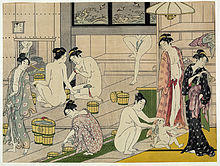
Ukiyo (浮世, "floating, fleeting, or transient world") describes the urban lifestyle, especially the pleasure-seeking aspects, of the Edo-period Japan (1600–1867). The Floating World culture developed in Yoshiwara, the licensed red-light district of Edo (modern Tokyo), which was the site of many brothels frequented by Japan's growing middle class. A prominent author of the ukiyo genre was Ihara Saikaku, who wrote The Life of an Amorous Woman. The ukiyo culture also arose in other cities such as Osaka and Kyoto.
The famous Japanese woodblock prints known as ukiyo-e, or "pictures of the Floating World", had their origins in these districts and often depicted scenes of the Floating World itself such as geisha, kabuki actors, sumo wrestlers, samurai, chōnin, and prostitutes.
The term ukiyo (when meaning the Floating World) is also an ironic allusion to the homophone ukiyo (憂き世, "Sorrowful World"), the earthly plane of death and rebirth from which Buddhists sought release.[2]
In its modern usage, the term ukiyo "The Floating World" refers more to a state of being: living in the moment, being detached from the bothers of life.
In popular culture
- Part of the dying, "old" Japanese culture after World War II in the novel An Artist of the Floating World by Kazuo Ishiguro.
See also
References
- ^ The Compact Nelson, Japanese-English Character Dictionary, Charles E. Tuttle Company, Tokyo 1999, ISBN 4-8053-0574-6
- ^ "憂き世の意味 - 古文辞書 - Weblio古語辞典". kobun.weblio.jp.